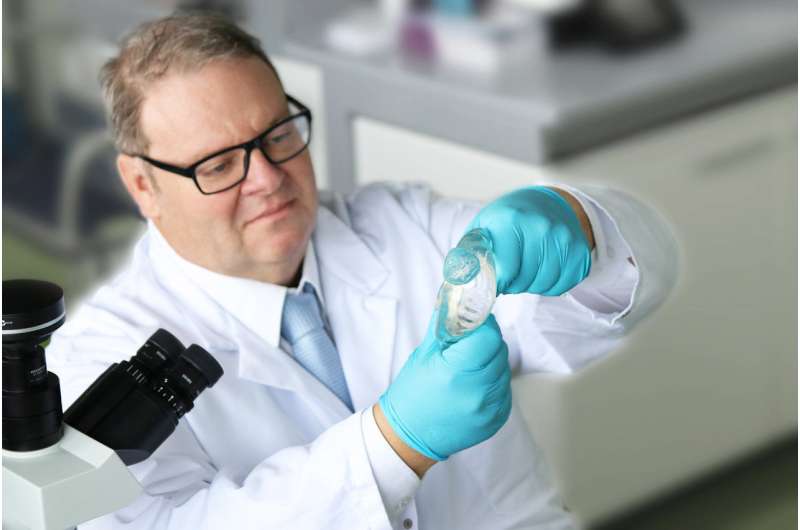Marking breast implants with tomato DNA to prevent counterfeiting

For years, a French company sold breast implants made of cheap industrial silicone components. Headline news when it broke in 2010, this scandal is still keeping the courts busy today. Now, a research team at the Fraunhofer Institute for Applied Polymer Research IAP has come up with a method to prevent this sort of fraud. It gives manufacturers the opportunity to counterfeit-proof implants – by tagging them with encapsulated tomato DNA.
With business going global, product counterfeiting has become a growing problem for manufacturers. Consumers are at risk when counterfeiters set their sights on sensitive products such as medical equipment and drugs. Fakes are usually inferior. They can seriously harm patients' health and even jeopardize lives, as the scandal surrounding a French breast implant manufacturer goes to show. The company cut corners, blending in unapproved silicones to slash production costs.
This kind of illegal manipulation is almost untraceable. It takes elaborate analyses to detect such tampering. "Counterfeiters generally buy high-quality individual components from reputable suppliers and stretch them with cheap silicone, which costs a fraction of the premium material. Product pirates turn huge profits," says Dr. Joachim Storsberg, a scientist at the Fraunhofer IAP in Potsdam and an expert witness in court cases centered on breast implants. A method to substantiate both quantitative and qualitative manipulations of one or more components would be ideal.
Zero chances of product piracy
Storsberg and his team – which includes Marina Volkert from Berlin's Beuth University of Applied Sciences – developed precisely this type of procedure. It has already been patented. The idea is to use DNA sequences as permanent markers to positively identify implants. This gives manufacturers the opportunity to tag products with a counterfeit-proof marker and thereby enhance patient safety. The source material is sure to raise eyebrows: tomato DNA makes the perfect marker, as various experiments have substantiated. "We isolated genomic DNA (gDNA) from tomato leaves and embedded it in the silicone matrix. We used approved siloxanes, which are building blocks for silicone products, to manufacture breast implants," explains Storsberg. The researchers managed to demonstrate the extracted DNA's temperature stability in pilot experiments. They vulcanized the gDNA in the host silicone at 150 degrees for five hours and then tested it with a polymerase chain reaction (PCR), a technique to amplify DNA, and with a special analytical method call gel electrophoresis. The DNA remained stable and did not degrade.
"Breast implants are made up of components; that is, several silicone polymers that cross-link to form a gel. The components' manufacturer now has the option of marking silicones with the encapsulated tomato DNA sequence during the production process. He alone knows the type and concentration of the DNA used. The components are marked first, and then sold to the implant manufacturer. The PCR method can detect if the manufacturer stretched components with inferior materials or used a lower concentration. "This works much like a paternity test," says Storsberg. The advantage of tomato DNA is that it costs next to nothing and is suitable as a counterfeit-proof marker for many polymer-based implants such lens implants.
The IAP researchers published their findings in Plastische Chirurgie, a plastic surgery journal.
Provided by Fraunhofer-Gesellschaft

















